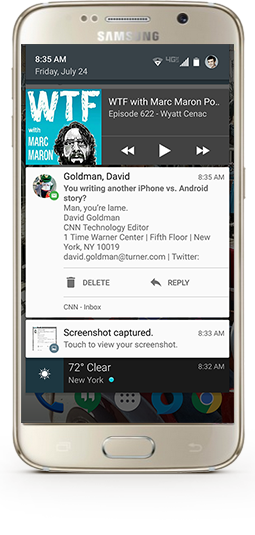Smartphones are in the hands of nearly everyone around us these days. Apple users know there is nothing worse than going to create a group chat and seeing a green text bubble go through instead of a blue one because at least one person they are sending the text to has an Android device. Smartphones are extremely compatible with nearly every other technology… if it's made by the same company. Let’s explore some of the pros and cons to Apple and Android smartphones according to CNN Business as they compare the two brands perform 15 basic tasks.

For starters, Apple won the unlocking feature form the fingerprint scanner being better than the Android. Although the newer iPhones utilize a facial recognition unlocking, it is less reliable and easier to hack. When it comes to making calls, CNN said that the Android had a better layout because it presents your frequent calls at the top, but the Apple iPhone still won this round due to the FaceTime feature. Androids first win comes in with regards to checking to the time. The Android comes with a “daydream” clock which dims the screen a lot but still shows the time while you sleep. For photos, CNN acknowledges that some Android phones have very poor photo quality while the iPhones camera quality is consistently great. However, Androids utilize Google Photos which gives its users free unlimited storage for their pictures. Android takes the cake yet again when it comes to the keyboard. Android swipe feature and the fact that punctuation is on the same screen as the letters makes typing much easier and quicker. The Android was deemed the winner yet again when thinking about home screen organization. According to CNN, Androids widgets are more useful that the ones apple put on the smartphones. Android far ahead in the lead is superior to Apple for their notifications as well because Android devices prioritize the notifications. They also make the more important ones larger. However, Apples come back in the game for their music. Although Android offers ad-included free music, Apple Music integrates nicely with downloaded iTunes songs. CNN goes back to favoring Android for its use of gmail as its default email app. With gmail, users can switch between multiple accounts which can be done on Apple, but it is more difficult to do. Even though Google Maps can be downloaded onto the iPhone, it is the standard mapping device for Android. Android wins the maps round because Apple’s Siri isn;t compatible with Google Maps. Once again, Android winning with its contact set up. Since it shows all the contacts pictures it makes it more simple to find the right person an Android user wishes to contact. Apple still reigns superior for their search feature. The Android's search bar goes directly to Google, but the one on iPhones allows its users to search emails, podcasts, the calendar, and much more. When wanting to set one's phone to vibrate, Apple achieves a win for having an actual switch on the side of the iPhone to change between settings. This has to be done through the volume section on the screen for an Android device. And finally, the iPhone wins the final task with Siri. Siri understands more natural language and has more of a personality than the Android which makes Siri more fun to talk to.
At the end of these 15 basic tasks, Apple had 6 wins while Android had 8. According to CNN’s analysis of just these basic tasks, Android is the better option.

However, according to Mark Spoonaur, the Apple iPhone is the best choice. He claims that the iPhone is faster and has better software. Additionally, he believes that the iPhone is easier to use than the Android. Mainly, his claim is based on that the iPhone features have basically not changed at all, only the appearance has been updates with some other new features, such as paying friends through iMessage. Another big plus Spoonauer meters is how well the iPhone pairs with the Mac. An iPhone can easily sync their calendar, contacts, photos, and music to their Mac to always have access to all their information.
In the end, it really comes to personal preference and what features each individual cares about and uses the most. Both brands of smartphones have many benefits as well as their downfalls.

